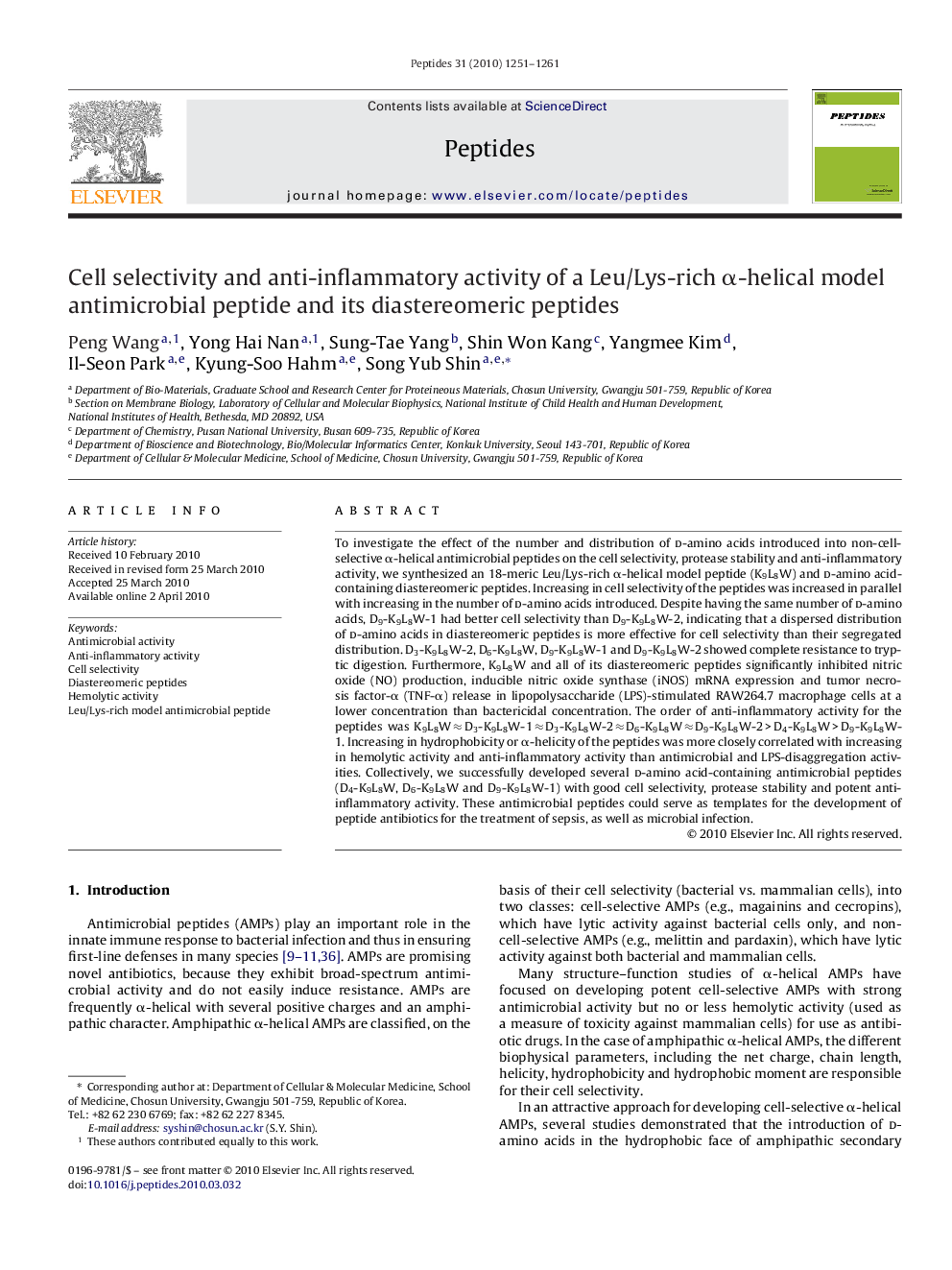| کد مقاله | کد نشریه | سال انتشار | مقاله انگلیسی | نسخه تمام متن |
|---|---|---|---|---|
| 2006615 | 1066347 | 2010 | 11 صفحه PDF | دانلود رایگان |
عنوان انگلیسی مقاله ISI
Cell selectivity and anti-inflammatory activity of a Leu/Lys-rich α-helical model antimicrobial peptide and its diastereomeric peptides
دانلود مقاله + سفارش ترجمه
دانلود مقاله ISI انگلیسی
رایگان برای ایرانیان
کلمات کلیدی
موضوعات مرتبط
علوم زیستی و بیوفناوری
بیوشیمی، ژنتیک و زیست شناسی مولکولی
زیست شیمی
پیش نمایش صفحه اول مقاله

چکیده انگلیسی
To investigate the effect of the number and distribution of d-amino acids introduced into non-cell-selective α-helical antimicrobial peptides on the cell selectivity, protease stability and anti-inflammatory activity, we synthesized an 18-meric Leu/Lys-rich α-helical model peptide (K9L8W) and d-amino acid-containing diastereomeric peptides. Increasing in cell selectivity of the peptides was increased in parallel with increasing in the number of d-amino acids introduced. Despite having the same number of d-amino acids, D9-K9L8W-1 had better cell selectivity than D9-K9L8W-2, indicating that a dispersed distribution of d-amino acids in diastereomeric peptides is more effective for cell selectivity than their segregated distribution. D3-K9L8W-2, D6-K9L8W, D9-K9L8W-1 and D9-K9L8W-2 showed complete resistance to tryptic digestion. Furthermore, K9L8W and all of its diastereomeric peptides significantly inhibited nitric oxide (NO) production, inducible nitric oxide synthase (iNOS) mRNA expression and tumor necrosis factor-α (TNF-α) release in lipopolysaccharide (LPS)-stimulated RAW264.7 macrophage cells at a lower concentration than bactericidal concentration. The order of anti-inflammatory activity for the peptides was K9L8W â D3-K9L8W-1 â D3-K9L8W-2 â D6-K9L8W â D9-K9L8W-2 > D4-K9L8W > D9-K9L8W-1. Increasing in hydrophobicity or α-helicity of the peptides was more closely correlated with increasing in hemolytic activity and anti-inflammatory activity than antimicrobial and LPS-disaggregation activities. Collectively, we successfully developed several d-amino acid-containing antimicrobial peptides (D4-K9L8W, D6-K9L8W and D9-K9L8W-1) with good cell selectivity, protease stability and potent anti-inflammatory activity. These antimicrobial peptides could serve as templates for the development of peptide antibiotics for the treatment of sepsis, as well as microbial infection.
ناشر
Database: Elsevier - ScienceDirect (ساینس دایرکت)
Journal: Peptides - Volume 31, Issue 7, July 2010, Pages 1251-1261
Journal: Peptides - Volume 31, Issue 7, July 2010, Pages 1251-1261
نویسندگان
Peng Wang, Yong Hai Nan, Sung-Tae Yang, Shin Won Kang, Yangmee Kim, Il-Seon Park, Kyung-Soo Hahm, Song Yub Shin,